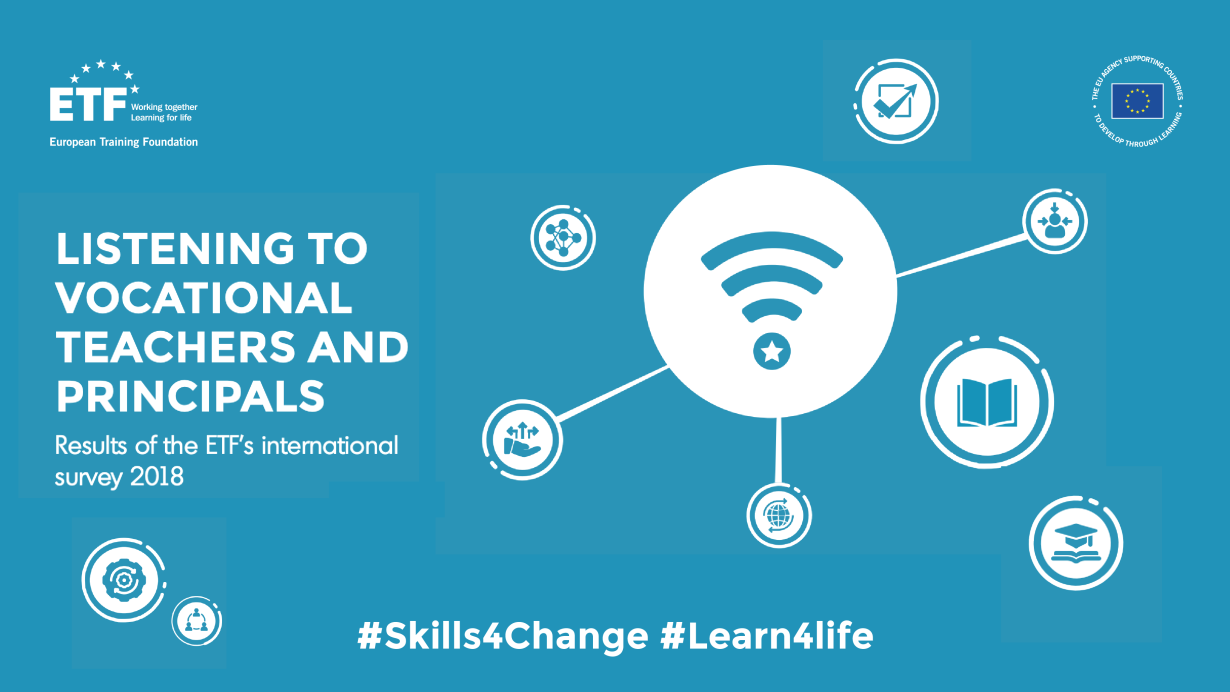
PRESS RELEASE: A window on the world of teachers in the EU neighbourhood
The European Training Foundation unveils a large-scale study of the professional experience of vocational teachers and school principals in nine countries.
Turin, 5 May 2021 — The European Training Foundation (ETF) has published the results of an international research into vocational teachers from nine countries in the EU neighbourhood: Albania, Algeria, Belarus, Kosovo, Moldova, Montenegro, Serbia, Tunisia and Turkey. The study, entitled “Listening to vocational teachers and principals”, focuses on their working experience and professional development. The largest of its kind to date, the study is based on a survey of over 10,000 teachers and some 750 school principals. Although run before the pandemic, the study includes insights to improve policy and practice in the field of teachers training.
“This report aims at providing support to policy makers: it reveals the extent to which teacher policies have been successfully implemented, and gives an inside view of how vocational teachers and principals experience their work and the challenges they face”, said Julian Stanley, Senior Human Capital Development expert, innovative teaching and learning at the ETF. “Principals are most likely to report that teaching and learning are constrained by shortages of teachers with competence to teach learners with special needs, but there are also often shortages of competent instructors for practical sessions. It remains the case, that a significant minority of vocational teachers have no initial pedagogical training at all.”
The majority of vocational teachers across the nine countries report that they practise both traditional and modern teaching methods. However, in most countries, traditional methods prevail. Most vocational teachers seek to make connections between classroom learning and the world of work, but students rarely have frequent contact with employers or enterprises.
Across all nine countries, 64% of vocational teachers participated in some kind of professional development in the previous 12 months. Serbia, Montenegro, Albania and Moldova all have participation rates of 80% or higher, while in Algeria, Tunisia and Kosovo participation was under 50%. However, only 38% of all vocational teachers attended training that addressed their vocational specialism, and only 48% participated in professional development (including study visits) on business premises.
In many countries, school principals identify a lack of qualified or well-performing vocational teachers as a barrier to good-quality instruction in their schools, and vocational teachers widely perceive that their profession is not valued in their societies.
The report “Listening to Vocational Teachers and Principals” is available here. Separate country reports that examine both the policy framework and the perceptions and behaviour of teachers are also available.
Background
The European Training Foundation is the EU agency supporting the countries of the EU neighbourhood to reform their education, training and labour market systems. It works with policymakers and practitioners to support reform, promote evidence-based approaches, document change, provide analysis and stimulate debate to anticipate new skills needs.More information
Report “Listening to Vocational Teachers and Principals”
Albania (country report)
Algeria (country report)
Belarus (country report)
Kosovo (country report)
Moldova (country report)
Montenegro (country report)
Serbia (country report)
Tunisia (country report)
Turkey (country report)
Conference ‘Building lifelong learning systems: skills for green and inclusive societies in the digital era’: www.etf.europa.eu/skills4change
Press team
Daria Santucci, Press Officer, daria.santucci@etf.europa.eu, +39 366 9639638; Michela Zabaglia, Press Trainee, michela.zabaglia@etf.europa.eu
Did you like this article? If you would like to be notified when new content like this is published, subscribe to receive our email alerts.